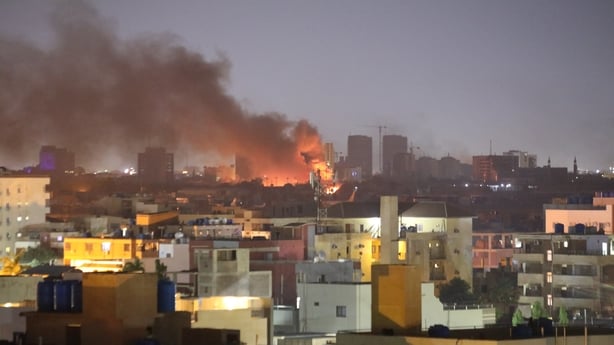United Nations aid workers in Sudan were hunkered down at home, as fighting spread across the country.
Speaking via video link from the Sudanese capital Khartoum, the UN special representative for Sudan, Volker Perthes, told reporters the situation on the ground was very fluid and dangerous.
UN agencies halted all aid operations on Saturday, after three Sudanese aid workers with the World Food Programme were killed.
As fighting continued, UN properties were caught in crossfire, while medical and food supplies were stolen from warehouses. Non-essential staff and relatives will have to be evacuated, he said.
"We cannot deliver when our staff is attacked, thrown out of their offices, their vehicles looted and sometimes even their residencies being on fire or destroyed," Mr Perthes said.
UN representatives have been in close contact with both warring leaders - army chief Abdel Fattah al-Burhan and his former deputy, Mohamed Hamdan Daglo, known as Hemedti, head of the paramilitary Rapid Support Forces (RSF).
The RSF grew out of the infamous Janjaweed militia, responsible for years of extreme violence in Darfur.
The two men seized power together in a coup d'etat, ousting the civilian government following months of pro-democracy street protests.
Both generals have been accused of human rights violations.

A political framework was hammered out to eventually see a return to civilian rule in the country. But it included a plan to integrate the paramilitary RSF forces into the regular army.
After months of tension, the proposed power-sharing gave way to a deadly power struggle.
UN officials said they were in constant contact with the two generals. They appealed for the armed forces to hold fire for three hours a day, to allow for food and aid deliveries.
"So far, both General Burhan and General Hemedti have reacted positively to my calls," Mr Perthes said,
"But also made clear that this is not an end to the fighting.It is pauses in the fighting for humanitarian purposes."
Asked by RTÉ News, how they respond to the attacks on UN property and staff, Mr Perthes said they "blame the other side".
Yesterday, diplomats at UN headquarters in New York called for an immediate cessation of violence.
In a joint statement, African members of the Security Council (Gabon, Mozambique and Ghana) warned the situation could escalate into a full-blown conflict and appealed to the warring factions to "swiftly embrace in the spirit of the Ramadan season".
US Ambassador to the United Nations Linda Thomas-Greenfield said "put down the guns and start talking."
UN Secretary General António Guterres called on "those with influence over the situation to use it in the cause of peace".
Who has influence?
What's going on in Sudan is of concern not just to neighbouring countries such as Chad, Ethiopia and Egypt, who fear regional instability, but to the world’s superpowers too.
Russia has long eyed a deal to build its first African naval base on Sudan’s Red Sea coast to accommodate up to 300 Russian troops and four navy ships, including nuclear-powered ones.
Sudan’s rich gold mines are of strategic interest to Moscow too, as Russia seeks to circumvent western sanctions. Russia is suspected of smuggling Sudanese gold, with the help of the Kremlin-backed Wagner mercenary group.
But the US has cautioned Sudan over its relations with Russia.
Moving ahead with plans for a Russian naval base would "be harmful to Sudan’s interests," the US Ambassador to Sudan, John Godfrey, said in an interview with Sudanese media last year.
The US has pushed for a return to a civilian-led government, which is more likely to favour deepening ties with western countries.
But this latest outbreak of hostilities is another major setback on Sudan’s long journey to democracy.







